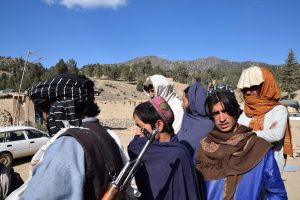KWANDA GHAR, PAKTIKA, AFGHANISTAN – The group of boys stand somewhat lost around a metal barrel in a dried out river bed framed by forested hills. Strewn around their feet lie vessels made out of brightly colored plastic that look like a cross between vases and watering cans. They are usually used for carrying water and washing; for the ablution before prayers or otherwise. But, just like in the dusty river bed, there is no water in the vessels or the barrel. The ongoing drought in Afghanistan has taken a heavy toll here in Kwanda Ghar, a remote corner in the southeastern province of Paktika.
And the drought is not the only problem. A detailed report by the Food and Agriculture Organization of the United Nations warned that “a devastating combination of drought, conflict and economic collapse,” the latter caused by the Taliban’s lightning takeover of Afghanistan in mid-August and the subsequent suspension of most international aid, will leave approximately 22.8 million Afghans facing high levels of food insecurity this winter. This amounts to around half of Afghanistan’s population and it remains unclear how the new Taliban regime can avert or at least minimize this crisis.
Fleeing to a War-Torn Country
The Taliban have not only to feed millions of their own population but also several thousand refugees. The boys who stood around the barrel in a far-flung place in Paktika as well as their and practically all other families in the area are not Afghans. They hail from Pakistan’s tribal area of Waziristan, which lies just beyond the hilltops that rise into the sky about two kilometers away from Kwanda Ghar.
The younger boys were almost certainly born in Afghanistan. “We came here about seven years ago,” Mir Qalam, a towering man with a big beard who lives in Kwanda Ghar told The Diplomat in early November. It is the same for practically all the other muhojerin in the large area stretching from Kwanda Ghar in the forested hills down to an arid high plateau. Muhojerin is the word for refugees that the local Pashto language adopted from Arabic.
“We fled the war,” Maibol, another refugee, replied when asked how they ended up here. The old man, whose black-dyed beard matches the color of his turban, referred to a large-scale military operation that the Pakistani Army launched in summer 2014 in Waziristan and which displaced thousands of people. Now Maibol lives in the hamlet of Jangkhoori Ada located far below Kwanda Ghar where the plateau meets the hills.
Amid Pakistan’s military action, many, including Mir Qalam and Maibol, fled over the disputed nearby border to Afghanistan’s province of Paktika, deeming the neighboring country, despite also being war-torn, safer; at least when compared to their homeland in Waziristan. Barmal, Paktika’s district where many refugees from Waziristan settled and where also Kwanda Ghar lies, is, like Waziristan, predominantly inhabited by members of the Wazir tribe. This eased the Pakistani Wazirs’ flight to Barmal, as the disputed Afghan-Pakistani border dating back to colonial times never managed to separate the Wazirs and other Pashtun tribes straddling the frontier.
How many refugees are living in Barmal is not known. The World Food Program (WFP), which for years has delivered food aid to the Pakistani refugees in Barmal and had another distribution in early November, has registered 2,541 refugees in Barmal. However, Said Yodgor, a refugee living in Laman, the main bazaar in the refugee area, said that he and most other refugees were never registered. “We could not register with anyone so far. Until this summer, there was war between the Taliban and the Afghan government which prevented us from going to government areas to register and aid organizations to come to us [deep in Taliban territory],” he explained. And since the Taliban takeover, there was apparently no effort to change this. Giving that everyone is still scrambling to adjust to new realities while facing numerous crises, the latter is not surprising.
Mir Qalam estimated that there are about 10,000 of his people in Barmal, but this is probably exaggerated. However, there are certainly several thousand refugees in Barmal alone.
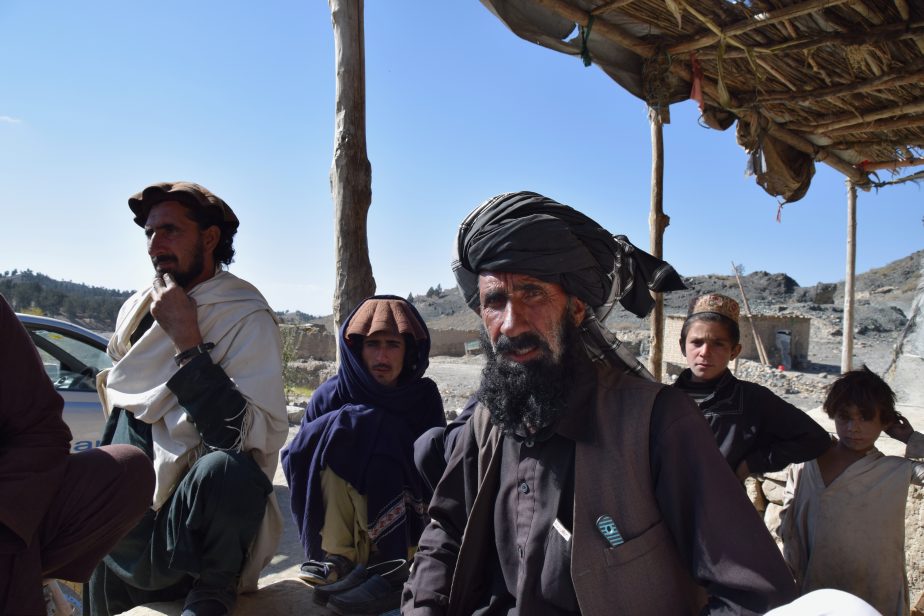
Maibol (with turban) and other Pakistani refugees who fled Pakistani military operations in their homeland in Waziristan to Jangkhoori Ada, Barmal District, Paktika Province, Afghanistan, November 8, 2021. Photo by Franz J. Marty
Depending on Food Aid
“Except for tending to some livestock, there is no work here,” Maibol and Said Yodgor complained independently from each other, describing why refugees struggle to sustain their families. Making a living out of the often barren land in Barmal is hard work under any circumstances; and as the good spots have been tilled by Afghans for centuries, the places the refugees could settle are almost always even more meager backwaters, making it all the more difficult.
“There are people here [in Kwanda Ghar] who haven’t eaten in two three days,” Mir Qalam claimed to exemplify how bad the situation has gotten. The dire state was also reflected in the frugal meal – a most simple vegetable stew with bread – that the villagers in Kwanda Ghar nonetheless insisted on serving. All urging that this was not necessary was to no avail; Pashtun hospitality demanded it, no matter what. In view of this scarcity, one wonders how the refugees survive at all.
Food aid distributed by the WFP is one part of the explanation. Mohammad Salim, the man in charge of the WFP distributions for three Afghan provinces, including Paktika, stated that the distribution to Pakistani refugees in Barmal in early November that The Diplomat witnessed was the third of its kind since the Taliban takeover of Afghanistan in mid-August.
Refugees claimed, though, that the aid they receive is insufficient and, in some places, arrives only infrequently. “We are grateful for the aid,” Faqir Mohammad a refugee who came all the way from Laman to the center of Barmal to receive aid said. The distributed aid consisted of a 46 kilogram bag of flour, 4.5 kilograms of cooking oil, and 8.5 kilograms of chickpeas for each family. “However, my family counts 20 people, so this won’t last long,” he added.
Maibol in Jangkhoori Ada further insisted that aid only arrived three times during the past year – much less frequent than the official WFP distributions. “And even then it was only one bag of flour for three households, which is not much at all,” he asserted. The reason for these differences could not be verified; however, it seems likely that the distributed aid is unofficially split up further down the chain.
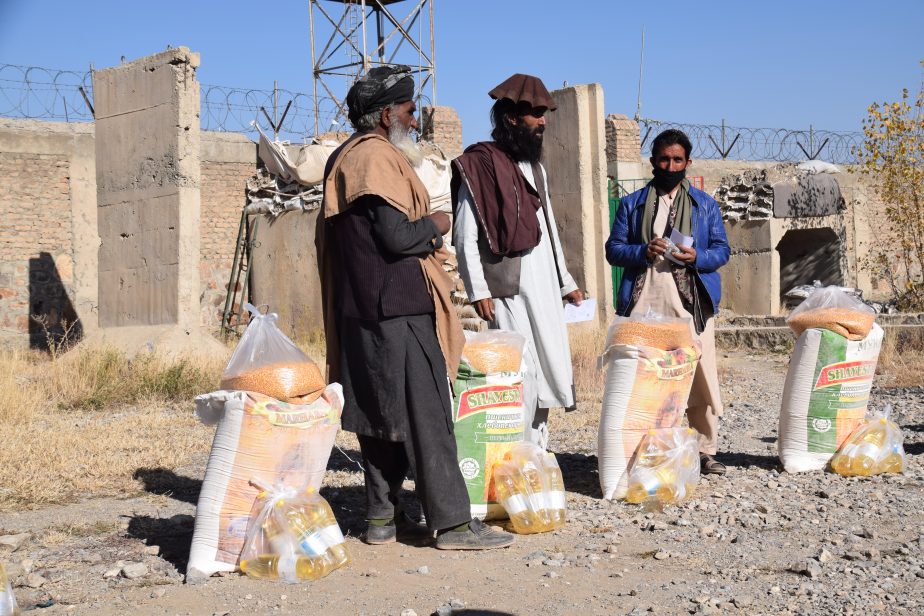
Pakistani refugees receiving food aid in the administrative center of Barmal District, Paktika Province, Afghanistan, November 8, 2021. Photo by Franz J. Marty
A Dwindling Lifeline
One other source of income that so far helped keep the refugees afloat, but which they only mentioned after several follow-ups on how they manage to survive, are the large forests covering the area. “We used to fell trees in the forest and then sell the wood,” Mir Qalam said, echoing what other men told The Diplomat. This was further confirmed by the regular sights of lorries full of wood, heading via remote dirt tracks and later potholed main roads to the provincial capital Sharana, and from there to many parts of Afghanistan including Kabul, where the wood is bought to feed stoves for cooking and, in the cold winters, heating.
“However, the new Taliban emirate has announced a country-wide ban on cutting down trees and this is a huge problem for us,” Maibol stated. He and other refugees seem to struggle to understand why such a ban was announced and at least some likely ignore it without talking about it; but there are sensible reasons for the ban. Uncontrolled clearing has razed whole forests to the ground elsewhere in Afghanistan, which led to erosion of the soil and, when it rains, landslides and floods that also threaten other plots of land.
While a more nuanced solution to this problem would and should be possible, it does not seem to be pursued. “We have already twice sent a request to the provincial government to make an exception on the wood chopping ban for refugees who have no other source of income,” Yodgor asserted, “but we still wait for a reply.”
Confronted with this, Muhibullah Hamas, the deputy of the provincial governor of Paktika, stated in Sharana that the country-wide ban was decided by the Ministry of Agriculture in Kabul and that the provincial government is following this decision. Asked about what, if anything, the Taliban government plans to do about the fact that the ban seriously endangers the already meagre livelihood of the refugees, Hamas only replied that they are in talk with aid organizations to get more help to the refugees. Given that aid is now needed in ever more places in Afghanistan and some will likely end up receiving nothing, it is questionable whether such an approach is realistic and can ease the plight of the refugees in Barmal.
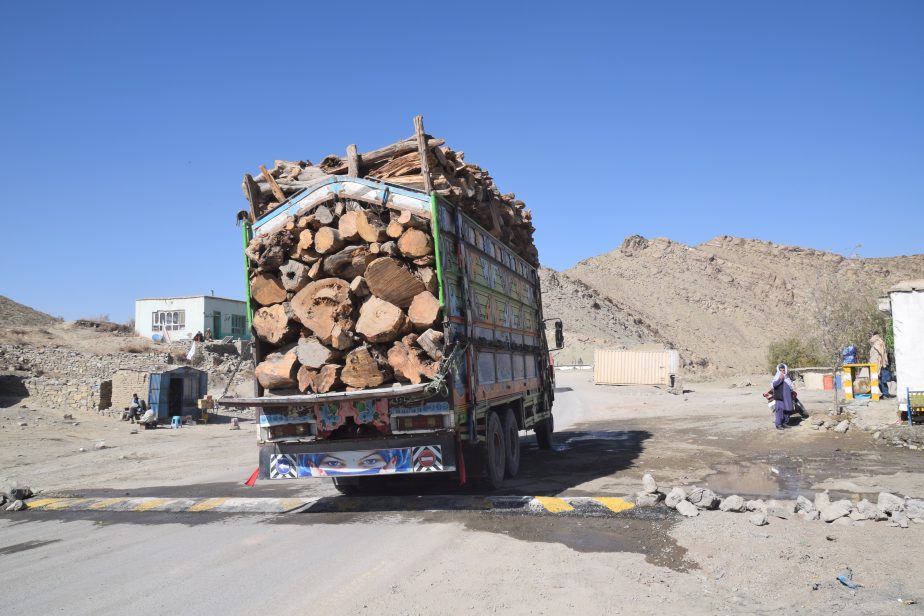
A lorry driving chopped fire wood from the forests of Paktika Province to Sharana, the capital of Paktika, and beyond. (Sarhawza District, Paktika Province, Afghanistan, November 7, 2021) Photo by Franz J. Marty
Armed “Refugees”
In view of this, the refugees in Barmal might be left to fend for themselves. And this might lead down a dangerous path, as there seems to be an alternative way for refugees that no one openly talks about.
Already now several refugees are armed, as The Diplomat witnessed in different places in Barmal. Said Yodgor, the man who sends requests on behalf of the refugees to Taliban authorities, is, in fact, one of their commanders. “I am with the Emirate [the Afghan Taliban],” he declares when asked about the assault rifle he carries with him. He then took two folded sheets of paper out of the inner pocket of his vest that he seemingly carries always with him. “This is a list of the 80 martyrs that we have given in the fight for the Emirate,” he explained, adding that “they were killed in battles with the [former] Afghan [Republican] Army or U.S. drone strikes.” Later, he proceeded to show pictures of his fallen brothers-in-arms before their funerals on his smartphone, white clothes tied around their lifeless heads surrounded by colorful garlands.
That many refugees fought and died for the Afghan Taliban was also apparent from several cemeteries in the refugee areas, as over countless graves the white flag of the Emirate of the Afghan Taliban fluttered in the breeze. In this regard it is noteworthy that in Afghanistan, the word “muhojerin” is not only used to refer to actual refugees, but also as a euphemism for foreign jihadists residing and fighting in Afghanistan, whether they are from Pakistan or farther afield.
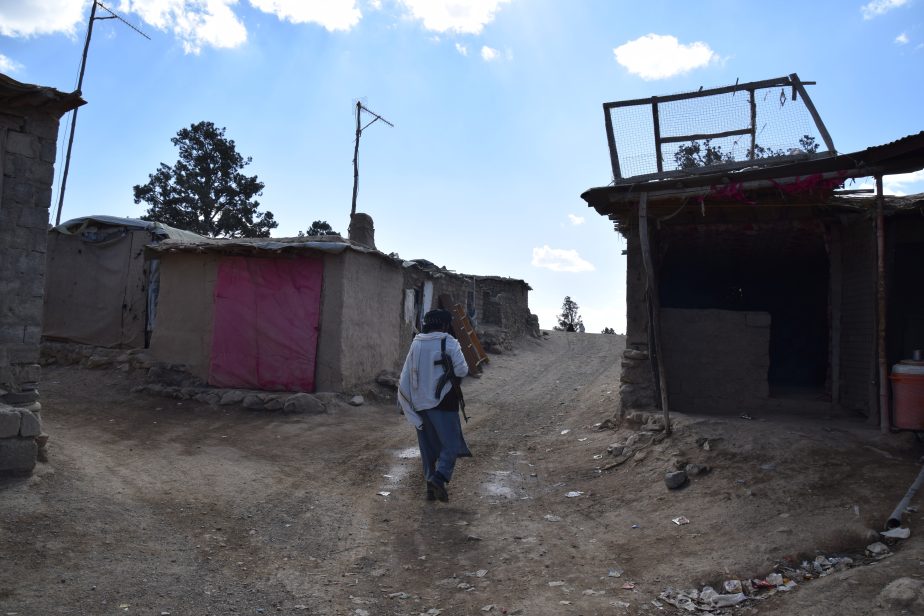
Said Yodgor, a commander of armed Pakistani refugees in Laman Bazaar, Barmal District, Paktika Province, Afghanistan, November 8, 2021. Photo by Franz J. Marty
Asked about it, Yodgor asserted that he has no specific position in the Taliban movement, which also means that he does not receive a salary. The Taliban in general have long claimed to not receive any money and to only serve God and their people; this is, however, only superficially true. While it indeed appears that the Taliban do not pay regular salaries to their men, research has shown that Taliban, in addition to free board and lodging, receive more or less regular cash stipends that they usually refer to as “presents.”
Where the Taliban get the money for such “presents” or the food and fuel that they buy, if they don’t take or receive it for free from civilians, could not be determined. However, it is most likely from a mix of licit and illicit funding streams. That the life of a jihadist is also not limited to the bare necessities was exemplified by the satellite-based WiFi dish and accompanying router that Yodgor has installed in a modest, mostly empty one-room mud hut in Laman Bazaar that functions as a place to receive visitors.
Paired with religious motivations, the prospect of receiving free board and lodging and irregular payments might draw more of the Pakistani refugees in Barmal to pick up arms, with their allegiance being subject to questions. For example, two Afghans who have personal contacts in the jihadist milieu, doubted Said Yodgor’s assertion that he is part of the Afghan Taliban. “He and his men are all members of the Tehrik-e Taliban Pakistan,” one of them who had once met Yodgor asserted. The other, based on a photo of Yodgor, said that the latter belongs to the Hafiz Gul Bahadur Group.
The Tehrik-e Taliban Pakistan (TTP) is an umbrella organization of several Pakistani jihadist groups; the Hafiz Gul Bahadur Group is a separately operating jihadist group from the Pakistani tribal areas that was, according to some analysts, in the past linked to the TTP. In any event, both groups have jihadist agendas focused on Pakistan and while the TTP has recently been in talks with the Pakistani government to explore a peaceful solution to their conflict, chances that this will succeed are more than fragile. Indeed, after a one-month long ceasefire that ended on December 9, the TTP again resumed attacks, accusing the Pakistani government of not having kept several promises to further negotiations.
In any event, the alleged presence of other jihadist groups than the Afghan Taliban in Barmal was contested by other sources. “The Tehrik-e Taliban Pakistan were here, but they all left for Pakistan about two three months ago,” Maibol told The Diplomat in early November. “The Emirate [of the Afghan Taliban] told them to leave, as the Emirate does not allow any people to stay in Afghanistan who might threaten other countries,” a Talib accompanying the author on his trip to Kwanda Ghar added. This echoed general and often repeated Taliban assurances that the Taliban stick to the counterterrorism guarantees that they gave to the United States in a historic agreement signed on February 29, 2020.
Be that as it may, the fact is that there are still armed refugees in Barmal and that more might join them. And with the war in Afghanistan being – apart from some underground activities of the self-declared Islamic State and currently insignificant pockets of other resistance – more or less over, they might eventually set their sight on other objectives.
When Yodgor was asked whether he wants to return to his homeland in Pakistani Waziristan he replied, “This is not possible; we want Islam and they want a republic. We want to stay here in Afghanistan and have even asked the Taliban government whether we can get Afghan ID cards.” Probed whether he and his men would not want to try to overthrow the Pakistani Republic like the Afghan Taliban toppled the Afghan Republic, Yodgor first only laughed, seemingly discarding it. Then he said: “God willing, if the right time will come.”













